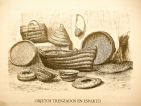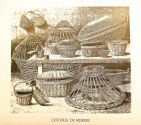
Rope-making
"In Palma and the surrounding areas there are 30 registered rope-making factories, plus an additional two in Manacor. Of these, only a third have some importance, while the majority are no more than very modest initiatives. The first, by contrast, merit special attention. In general, they make ropes from hemp and esparto grass, though larger workshops also use abacà or Manila hemp (Musa textils Manila) and jute, originating respectively from the Philippines, India and America. One of the most important rope factories is the one located since 1861 in a large building in Santa Catalina’s Arrabal district. It has an 18-horsepower steam machine, potent enough for ships and other ends. It works with hemp, abaca and occasionally with esparto grass, in addition to making cotton sails for boats, something we have already seen when talking previously about textiles.
On Mallorca they also manufacture various types of weaves, characterized by their delicate finishes. These are abundant especially in Andratx and Capdepera, and made from palm leaves (palmito). All these products are made in homes and, as we’ll soon see, cannot be considered factory-made products. They also make ropes from càritx to tie bundles of wheat. These ropes are known as vencills, and some are also made of esparto grass.
The most highly praised weaves are made from palm leaves, principally those in the region of Andratx and in Capdepera, as well as those from Pollença and Alcúdia. Precisely in Capdepera there has been notable development in this respect over the last few years, and, if we include Andratx, it would lead us to suppose a manufacturing boom. This is certainly not the case, since the weaving industry is limited to merely domestic and individual companies in which women, men and children take part in their free time.
 We have already mentioned the use of weaves to make seats for rustic chairs. Some demonstrate notable skills in this labor and create very fun and elaborate designs as demonstrated in the engraving: chairs of mine made in establiments.
We have already mentioned the use of weaves to make seats for rustic chairs. Some demonstrate notable skills in this labor and create very fun and elaborate designs as demonstrated in the engraving: chairs of mine made in establiments.
Amongst the products whose weave is made with large, flat needles (saquera), we have to distinguish a type of hat which farmhands on the plain tend to wear when carrying out their chores. Similarly, worth note are the sàrries used to transport fertilizer, the beasses or double panniers for Mallorcan mules; the morrions to hold these animals’ feed, for example, during a trip; or a larger and taller type of morrió with a handle to make it more manageable, though the latter is still not very common except in Pollença; the cucales used to cover the eyes of the animals turning waterwheels and mills; and we are also familiar with the ventadors used to stoke fires; the estorins, small, circular mats used to gather what has been swept up; morrionets, small, flat and open baskets used to keep money, especially coins; senalles baskets of all types, size and shapes, from the widest to transport earth and rocks to those known as dur carn (literally, “hard meat”) which are deeper and closed; and also senalletes, some with lids.
 Esparto grass is woven everywhere on Mallorca and used to make long-lasting and also flexible objects.
Esparto grass is woven everywhere on Mallorca and used to make long-lasting and also flexible objects.
 The majority of baskets destined for agricultural and domestic use is woven with thin strips of reed, though the bottoms and upper edges tend to be made of young olive tree and common reed sprouts (verducs). These baskets are extremely durable and suffer hardly any wear when wet which, since this material has a type of shiny and glassy outer layer, resists inclement weather very well. Baskets come in different shapes and sizes: the coves are very large, round in shape, with a large opening up top and two small handles. They tend to measure 36 cm tall, with a 35 cm diameter up top and 25 below. They are used primarily to transport oranges and other fruits to the market. They are found the most in the towns of Sóller and Deià. The so-called covos de dos por tres are the largest and used preferentially to store olives. Other smaller ones, though very similar in shape, are introduced in the sàrries used to transport fruit by mule. The covos de rentar (“washing baskets”) are used to take clothes to the washing sites. These also measure 36 cm high, but their diameter at top is 55 cm by 32 below. As indicated by their name, the covos de pescador (“fishermen’s baskets”) are used to transport fish. They are 16 cm high and have an upper and lower diameter of 43 and 40 cm, respectively.
The majority of baskets destined for agricultural and domestic use is woven with thin strips of reed, though the bottoms and upper edges tend to be made of young olive tree and common reed sprouts (verducs). These baskets are extremely durable and suffer hardly any wear when wet which, since this material has a type of shiny and glassy outer layer, resists inclement weather very well. Baskets come in different shapes and sizes: the coves are very large, round in shape, with a large opening up top and two small handles. They tend to measure 36 cm tall, with a 35 cm diameter up top and 25 below. They are used primarily to transport oranges and other fruits to the market. They are found the most in the towns of Sóller and Deià. The so-called covos de dos por tres are the largest and used preferentially to store olives. Other smaller ones, though very similar in shape, are introduced in the sàrries used to transport fruit by mule. The covos de rentar (“washing baskets”) are used to take clothes to the washing sites. These also measure 36 cm high, but their diameter at top is 55 cm by 32 below. As indicated by their name, the covos de pescador (“fishermen’s baskets”) are used to transport fish. They are 16 cm high and have an upper and lower diameter of 43 and 40 cm, respectively.
 Mallorcan basket-making not only makes use of reeds but, as in our latitude, also wicker (vimanera), the thicker variety gathered on the island itself while thinner varieties are brought from Catalonia and abroad, especially France."
Mallorcan basket-making not only makes use of reeds but, as in our latitude, also wicker (vimanera), the thicker variety gathered on the island itself while thinner varieties are brought from Catalonia and abroad, especially France."
Archduke Ludwig Salvator of Austria. Las Baleares por la palabra y el grabado. Majorca: General Part. Ed. Sa Nostra, Caja de Baleares. Palma de Mallorca. 1982.

























